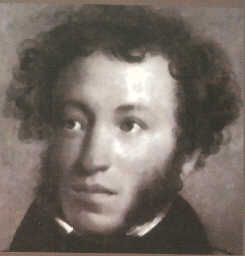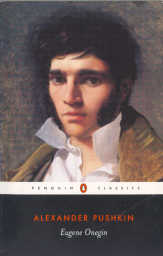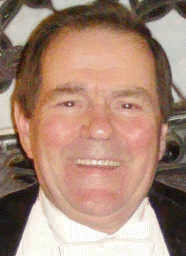[page 21 CHAPTER I XXIX ]
In days of carefree aspirations,
the ballroom drove me off my head:
the safest place for declarations,
and where most surely notes are sped.
You husbands, deeply I respect you!
I'm at your service to protect you;
now pay attention, I beseech,
and take due warning from my speech.
You too, mamas, I pray attend it,
and watch your daughters closer yet,
yes, focus on them your lorgnette,
or else. . . or else, may God forfend it!
I only write like this, you know,
since I stopped sinning years ago.
For comparison I offer you a short quartrain by Hoffenstein:
I shall pluck the moments now —
Only folly weeps to miss one;
Let some later lover's brow
Wrinkle at the thought of this one!
Pushkin even devotes a stanza in which he separates himself as poet from Onegin his character in the novel,
and while he's at it, makes a preemptive strike on any critic who would claim he is only writing about himself.
[page 33 CHAPTER I LVI ]
O flowers, and love, and rustic leisure,
O fields — to you I'm vowed at heart.
I regularly take much pleasure
in showing how to tell apart
myself and Eugene, lest a reader
of mocking turn, or else a breeder
of calculated slander should,
spying my features, as he could,
put back the libel on the table
that, like proud Byron, I can draw
self-portraits only — furthermore
the charge that poets are unable
to sing of others must imply
the poet's only theme is 'I'.
By the end of the first chapter, Tatyana has yet to appear, and Pushkin is looking over his work so far and
critiquing, but refusing to change it one whit, and he sarcastically refers to the writer's reward as little more than
"misunderstanding, noise, and blame".
[page 35 CHAPTER I LX ]
I've drawn a plan and a projection,
the hero's name's decided too.
Meanwhile my novel's opening section
is finished, and I've looked it through
meticulously; in my fiction
there's far too much of contradiction,
but I refuse to chop or change.
The censor's tribute, I'll arrange;
I'll feed the journalists for dinner
fruits of my labor and my ink. . .
So now be off to Neva's brink,
you newborn work, and like a winner
earn for me the rewards of fame
misunderstanding, noise, and blame!
Finally, in the twenty-fourth sonnet of Chapter 2, the novel's heroine appears, introduced this way,
"Tatyana was her name . . . /I own it, self-willed it may be just the same;/but it's the first time you'll have known
it,/a novel graced with such a name." Pushkin writes as though he already knew his novel would become famous
and its heroine a hit along with it.
Here are his first words of description with which he builds a foundation for the enigma of Tatyana, comparing her at first to Olga, her sister.
[page 48 CHAPTER 2 XXV ]
So she was called Tatyana. Truly
she lacked her sister's beauty, lacked
the rosy bloom that glowed so newly
to catch the eye and to attract.
Shy as a savage, silent, tearful,
wild as a forest deer, and fearful,
Tatyana had a changeling look
in her own home. She never took
to kissing or caressing father
or mother; and in all the play
of children, though as young as they,
she never joined, or skipped, but rather
in silence all day she'd remain
ensconced beside the window-pane.
What crafter of verses would not wish someone in the future to point at his photo and say, "He was a poet
in his day." Nabokov might be a great writer, but if he translated this Pushkin novel into literal, word-by-word
prose, how can the reader understand all the comments that Pushkin embeds about himself as poet? Take this
next stanza, which closes Chapter 2
[page 56 CHAPTER 2 XL ]
And someone's heart will feel a quiver,
for maybe fortune will have saved
from drowning's death in Lethe river
this stanza over which I slaved;
perhaps — for flattering hope will linger —
some future dunce will point a finger
at my famed portrait and will say:
he was a poet in his day.
I thank him without reservation,
the peaceful Muses' devotee,
whose memory will preserve for me
the fleeting works of my creation,
whose kindly hand will ruffle down
the laurel in the old man's crown!
This next sonnet could be labeled "A Whine to a Wine" or "A Toast to Bordeaux". Pushkin seemed sated
with the frosted bottles with the bubbling froth of champagne, and sings the praises of a wine which never seems
to over-excite nor tire his palette.
[page 100 CHAPTER 4 XLVI ]
Yet hissing froth deals a malicious,
perfidious blow to my inside,
and now it's Bordeaux the judicious
that I prefer to Champagne's tide;
to Aÿ's vintage in the sequel
I find myself no longer equal;
for, mistress-like, it's brilliant, vain,
lively, capricious, and inane. . .
But in misfortune or displeasure,
Bordeaux, you're like a faithful friend,
a true companion to the end,
ready to share our quiet leisure
with your good offices, and so
long life to our dear friend, Bordeaux!
In New Orleans, we have streets named after all the Muses, Calliope, Melpomene, Terpsichore, Thalia,
Erato, etc. Few natives know that Erato is the Muse of Poetry, Melpomene of Tragedy, Terpsichore of Dance,
Thalia of Comedy, and this novel's muse: Calliope, the Muse of Epic Poetry, but likely in Pushkin's day in the
early 19-th century, most of his intended readers did know and required no explanation of the connection of the
Muses with their place of mention in the next sonnet:
[page 170, CHAPTER 7 L ]
But where, mid tragic storms that rend her,
Melpomene wails long and loud,
and brandishes her tinsel splendor
before a cold, indifferent crowd,
and where Thalia, gently napping,
ignores approval's friendly clapping,
and where Terpsichore alone
moves the young watcher (as was known
to happen long ago, dear readers,
in our first ages), from no place
did any glasses seek her face,
lorgnettes of jealous fashion-leaders,
or quizzing-glasses of know-aIls
in boxes or the rows of stalls.
This sonnet sings the praises of Tatyana and ends with a humorous Hoffensteinian couplet that is too
delicious to miss sharing with you, dear Reader:
[page 171, CHAPTER 7 LII ]
The night has many stars that glitter,
Moscow has beauties and to spare;
but brighter than the heavenly litter,
the moon in its azure of air.
And yet that goddess whom I'd never
importune with my lyre, whenever
like a majestic moon, she drives
among the maidens and the wives,
how proudly, how divinely gleaming,
she treads our earth, and how her breast
is in voluptuous languor dressed,
how sensuously her eyes are dreaming!
Enough, I tell you, that will do
you've paid insanity its due.
When Onegin returns after many years to find the young maiden Tatyana grown up into a majestic woman,
he is upset to discover that she has married in his absence. In Sonnet XXI of Chapter 8, Pushkin writes about
what ails him, referring to love as youth's derangement. "What ails him? he's in some strange daze! what moves
along the hidden ways in one so slothful, so hard-bitten? vexation? vainness? heavens above, it can't be youth's
distemper — love?"
One cannot spend hours reading Pushkin without the Muse Erato flitting around and flirting with one's pen.
That is the only excuse I can offer for writing these two quatrains to say goodbye to Pushkin:
In closing now, it's fitting that I end
with a poetic tribute to our friend.
You see, dear Reader, you and I must bye,
but let it not be said we didn't try
To read these Pushkin sonnets carefully —
glimpsing the Tanya only he could see.
But I must let the master have his say
to wish Adieu to you and me today.
[page 200 CHAPTER 8, XLIX ]
Reader, I wish that, as we parted —
whoever you may be, a friend,
a foe — our mood should be warm-hearted.
Goodbye, for now we make an end.
Whatever in this rough confection
you sought — tumultuous recollection,
a rest from toil and all its aches,
or just grammatical mistakes,
a vivid brush, a witty rattle —
God grant that from this little book
for heart's delight, or fun, you took,
for dreams, or journalistic battle,
God grant you took at least a grain.
On this we'll part; goodbye again!
Pushkin claimed to be Russia's Mozart, but after reading his epic poem of the odyssey of Onegin, I find
Pushkin worthy to have the title of Russia's Homer.





